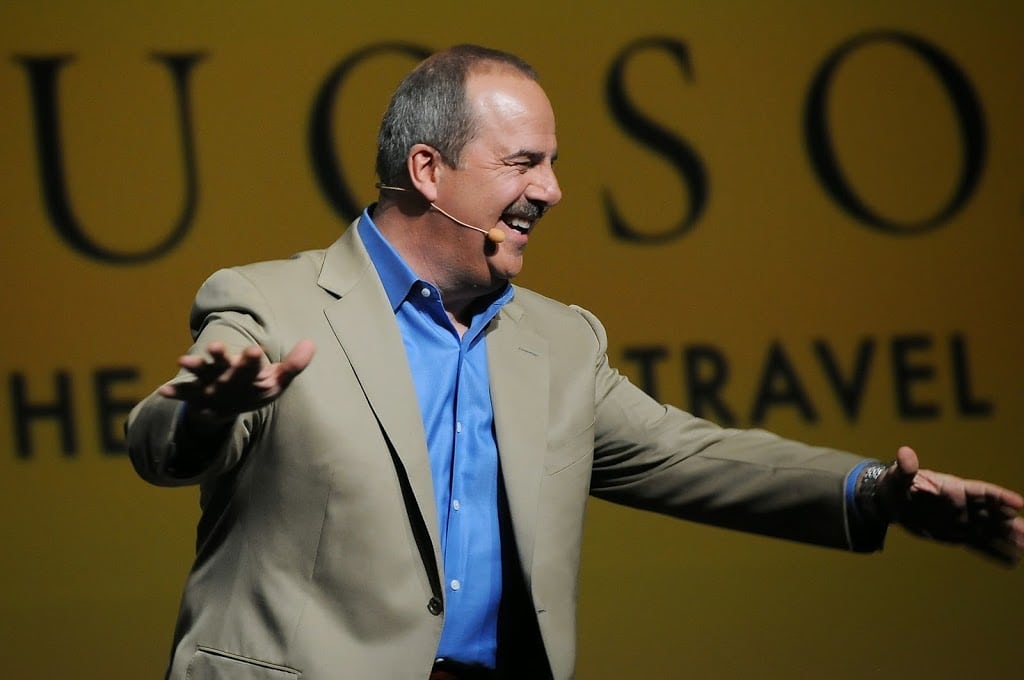Skift Take
When online booking engines decimated the travel agent industry beginning in the late '90s, it was the "human vending machines" who went out of business, not the real travel advisors.
I had a front row seat during the implosion of the travel agent industry during the late 1990s when the airlines began cutting agent commissions down from the traditional 10% to 5% to eventually zero.
When those commissions flatlined, I was covering the travel agent industry for a trade magazine and traveling with agents on fam (familiarization) trips hosted by suppliers.
After I left the magazine in 2004, I wrote off the travel agent industry like so many other consumers and travel trade colleagues at the time. Why would you buy travel any other way than online? Many of us imagined that only conservative, cautious people who haven’t traveled much would book travel through an agent.
That’s how things remained for a decade until I attended Virtuoso Travel Week in Las Vegas last month [click here for our coverage]. Virtuoso is a consortia of 340 travel agencies in the Americas and Australia/New Zealand selling luxury travel product totaling $12.5 billion in sales annually, up from $9.6 billion in 2011.
It’s not all rosy: The Bureau of Labor Statistics projects that the number of people employed as agents will decline an additional 12% between now and 2022.
I spoke at length last week with Matthew Upchurch, CEO of Virtuoso. The following Q&A has been edited slightly for length, because when Upchurch gets going, he is not short for words.
Skift: Take us back to the early days when the travel agency model first flourished.
Matthew Upchurch: What happened was, when Max Hooper, the father of Sabre who invented the GDS (Global Distribution System), the travel agency business exploded. It exploded because they made a very important and clever decision to automate airline ticketing distribution and outsource the processing to agents. Then the airlines began consolidating. We had the deregulation of the air system and everything started to mushroom.
So what you saw was this massive explosion of quote/unquote travel agents, but the reality of it was, basically what we call travel agents got mixed up between real travel advisors and what I call “BUIs”—biological user interfaces. The latter were basically human translators of what was in the GDS. In other words, the agencies hired lots of people and simply taught them the languages of Sabre, Apollo, Worldspan, or whatever.
Skift: And then the online booking revolution changed everything. What was the spark?
Matthew Upchurch: In the late ’90s, easySabre starts to come out, and Rich Barton, an executive at Microsoft, goes to Bill Gates and says, “Hey, one of the ways that we can prove why people should migrate off of DOS onto Windows is by showing how we can take something really complex and make it user friendly.” So there was the birth of Expedia.
Then you have the airline commission cuts because you have the birth of easySabre, Travelocity, Expedia, and a massive amount of business goes online. People start booking direct.
But what gets lost in the story, what we forget about in history, is that in the 1950s, the percentage of travel booked directly by consumers with the suppliers was actually greater than it is today. Almost all of the airline tickets on Pan Am and BOAC were booked by consumers calling the airlines.
Skift: So when, or why, did consumers begin going to travel agents in large numbers?
Matthew Upchurch: The reason you went to a travel agent in 1951 was because you wanted service and you wanted information beyond just booking the ticket, from someone who knew the destination, who knew the people, who knew where to go for dinner.
During the online revolution, agents who were basically human vending machines were replaced, but airline executives were scratching their heads wondering how the hell could so many others survive when, for a while there, their commissions were cut to zero. That is because the airline industry saw the travel agency distribution system as an extension of them. But it’s not an extension of them. It’s an extension of the consumer.
Then agencies started charging ticketing fees to make up for the lost revenue, and the airlines were like: “You mean people are willing to pay 30 bucks to process an airline ticket, yet I will lose a passenger to Southwest based on a $10 fare difference?”
Skift: And the agent industry didn’t really have a strong enough advocacy arm or deep enough resources to combat the online retailers and their big budgets.
Matthew Upchurch: There’s literally billions of dollars of marketing that is spent on the online world that basically says: “Everything has gone online, and frankly you’re stupid if you trust someone else to help you.” And that’s extremely predominant in all kinds of industries, like financial consulting with E-Trade and Ameritrade. They’re saying: “Here’s all the tools to do it yourself.”
Because the travel agency profession was viewed through the lens of the lowest common denominator, and because of the rise of the really great technology, the comparative shopping, the idea that you could get the lowest price, and all of the never ending innovation to make things easier, there’s this whole other side of the story that kind of got lost.
And that is, our industry is doing better, we are actually growing now. What’s very interesting is, our best customers, who are very intelligent and sophisticated travelers, and extremely well traveled and tech savvy, they love our advisors.
Skift: How has the rise of the Millennial traveler affected the agent industry?
Matthew Upchurch: A lot of people thought we would be out of business because of Millennials. The Millennials would come along, they would do everything online, and we’d be whatever.
The exact opposite is happening. What’s happening today is we are actually attracting Millennials into this business like never before. You know, I’m 52, I’ve been doing this for 30 some odd years, and I have never seen people come into our business and go from zero to a multimillion dollar producing travel advisor in a shorter amount of time than they are today.
That’s the social media effect. For Millennials, they’re like: “I don’t care what some brand says, they’re all bragging about themselves. I care about my friends, I care about my community, I care about the people I respect and who I’m connected to.”
Fifteen years ago, if you started out as a travel advisor, you would walk into a travel agency, they would put you in a cubicle, you would have your dumb terminal, your Sabre terminal, and you would be lucky if you took one or two fam trips that first year. You were basically like a call center person.
Skift: And now?
Matthew Upchurch: Today, the two most powerful technologies that have rocket boosted our profession are social media and mobility, because today, our young advisors, they don’t come in and sit down at some cubicle. They start traveling. They start going around the world and they start posting on their social media, and so their credibility is that they’re actually out there.
Now some of the veteran advisors are saying these guys aren’t paying their dues like I did, and they’re always traveling. That’s BS. These guys 20 years ago were working primarily 9 to 5 jobs. Today’s travel advisors, they’re always traveling and they’re working 24/7, and because of mobility, they have Sabre on their laptops. They have access to everything.
Skift: Who’s paying for these kids to fly all over the place?
Matthew Upchurch: That’s a really good question. You know, I’ve never even really thought of it that way.
The fam trip of old has pretty much disappeared. Today, the really good suppliers of the world look at your production, they look at who you are. The old idea that I could throw up a shingle and call myself a travel agent—maybe I’m a doctor’s wife and basically it’s a hobby—that stuff is over. Someone like Starwood is going to validate your production.
So here’s the deal. When you have an affiliation with Virtuoso, when you have an affiliation with a travel agency like Valerie Wilson, they know we deliver the highest yielding business to our suppliers. Now, you can look at that from two perspectives. The cynical view is: “You’re delivering the highest yield in the business because those customers are paying more than they need to.” No, that’s what a price-driven competitor would say….
What’s happening is, if the advisor is connected to an organization like ours, or a trusted agency, the suppliers are dying to have these guys come and experience those things. Because today, because of social media, when they check in and they do their Instagram, Facebook and Twitter, or whatever, the suppliers see instant business.
Skift: What about the value of travel advisors from the standpoint of providing highly customized service to the busy luxury traveler who wants to be pampered?
Matthew Upchurch: That is our entire reason for living. If it weren’t for the fact that we’re available, that we are intelligent, that we save time and do all those things, we wouldn’t be here. I think the reason why we haven’t done that, and how we’re trying to figure out how best to do that, there’s this push and pull between clients wanting to do their own research and those who don’t. They’re all over the range about how much time they want to be involved.
So we’re starting to teach advisors how to better be able to deal with different personality types. You have the fact finder who likes to get into the nitty gritty, the details, the whole nine yards. And you’ve got to deal with them differently than those people who are like, “I trust you, you’re responsible, give me this. I don’t want a 50-page PowerPoint about the trip, I want a one-page synopsis.”
So part of it is really learning that one of the more important skills of being an advisor today is adjusting your style and how you do business. For some people, they say I can’t adjust my style for different types of customers. So what we’re seeing now is certain types of advisors beginning to attract like-minded customers.
Skift: How can advisors build loyalty among their clients in today’s travel sales environment?
Matthew Upchurch: The number one thing consumers have told us during studies from six years ago to today, and it has not changed, is that the difference between a transactional travel agent and a trusted travel advisor is the conversation after the trip. So if I call you after a trip and I ask you how did it go, you might say it was great. A really good travel advisor is going to prod you, because a lot of times if something didn’t go right, you might not mention it.
A good advisor will say something like, “If you could change anything about the trip, what would it be?” What happens is during that conversation, you start to build this collaboration and the advisor becomes more and more an expert in you, and what you like and what you don’t.
I’m a huge fan of technology, I have been my entire life, but my saying always is: “Automate the predictable so you can humanize the exceptional.” And I think as technology continues to get better and better, people will have more and more craving for authentic human connection.
The Daily Newsletter
Our daily coverage of the global travel industry. Written by editors and analysts from across Skift’s brands.
Have a confidential tip for Skift? Get in touch
Tags: ceo interviews, travel agents
Photo credit: A promotional image from Virtuoso Travel Week. Virtuoso

